The Roots of Our Addiction Epidemic If you are like most Americans, including many who work in the field of addiction medicine, …
addiction epidemic
We Work With Most Major Insurance Providers
Call 866-440-3523 for more information or fill out our confidential insurance verification form.


 verify insurance
verify insurance




